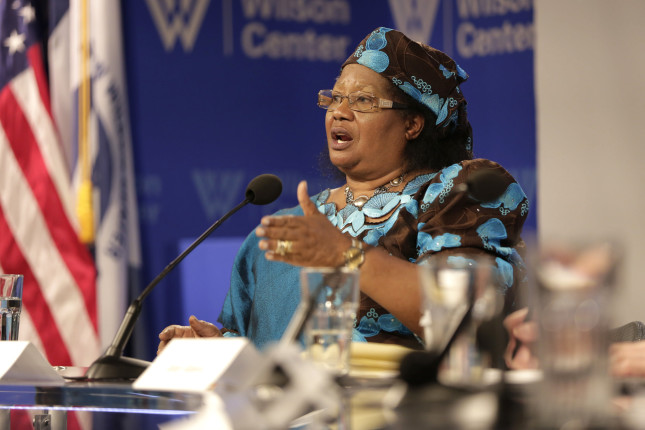-
From Day One: Malawi President Joyce Banda on Girls Ages 0-10
July 23, 2018 By Yuval Cohen
“Over 130 million girls around the world are not in school through no fault of their own,” said Her Excellency Joyce Banda, former president of the Republic of Malawi, at the launch of her new book, From Day One: Why Supporting Girls Aged O to 10 Is Critical to Change Africa’s Path, at the Center for Global Development.
“Girls and women are one of our continent’s most valuable assets,” said Banda, who was a Wilson Center Distinguished Fellow, “yet there are still many…bright, ambitious, village girls full of potential ready to become the kind of leaders that Africa needs so badly and does not get.”
Why girls aged 0 to 10? This critical age is overlooked and lacks attention and data, said Banda and her coauthor Caroline Lambert. The education of girls under age 10 is not prioritized, and they tend to be responsible for domestic duties that affect their health, such as carrying water long distances, straining their backs. In addition, some are subject to dangerous medical procedures such as genital cutting—all before the age of 10.
Most programming for girls’ health and education starts at age 11 or older—but those programs miss a crucial stage in girls’ lives. “By that time,” said Banda, “for an African woman, it is too late.”
Chiefs and traditional leaders are key levers of change. “When a chief says, ‘Every girl child in this village shall go to school,’ every child shall go to school,” said Banda. “It is just a lost opportunity” to not capitalize on these potentially powerful advocates.
Like her book, Banda’s life work focuses on empowering people from African countries to change the course of their development together—and girls’ education is key to fostering effective, change-oriented leadership for the future.
“If we want to change Africa’s narrative, we need women leaders,” said Banda. “I am an African woman who has lived it—let me be the one to take responsibility and raise my voice on behalf of that gap.”
Joyce Banda was a Distinguished Fellow at the Wilson Center in 2017, where she launched her paper “From Day One: An Agenda for Advancing Women Leaders in Africa.”
Read more:
- To realize the demographic dividend, we must change mindsets around education for young girls, Kathleen Mogelgaard writes.
- Investing in girls’ education can make communities more resilient in the face of climate change, according to research from Brookings.
- Efforts to combat HIV in girls must be aimed at 9 to 14 year olds, given the high rates of sexual violence in some countries, says Ambassador Deborah Birx.
Sources: Center for Global Development
Topics: Africa, development, Dot-Mom, education, family planning, featured, GBV, gender, global health, Malawi, maternal health, media, On the Beat, SDGs, youth
 A Publication of the Stimson Center.
A Publication of the Stimson Center.






